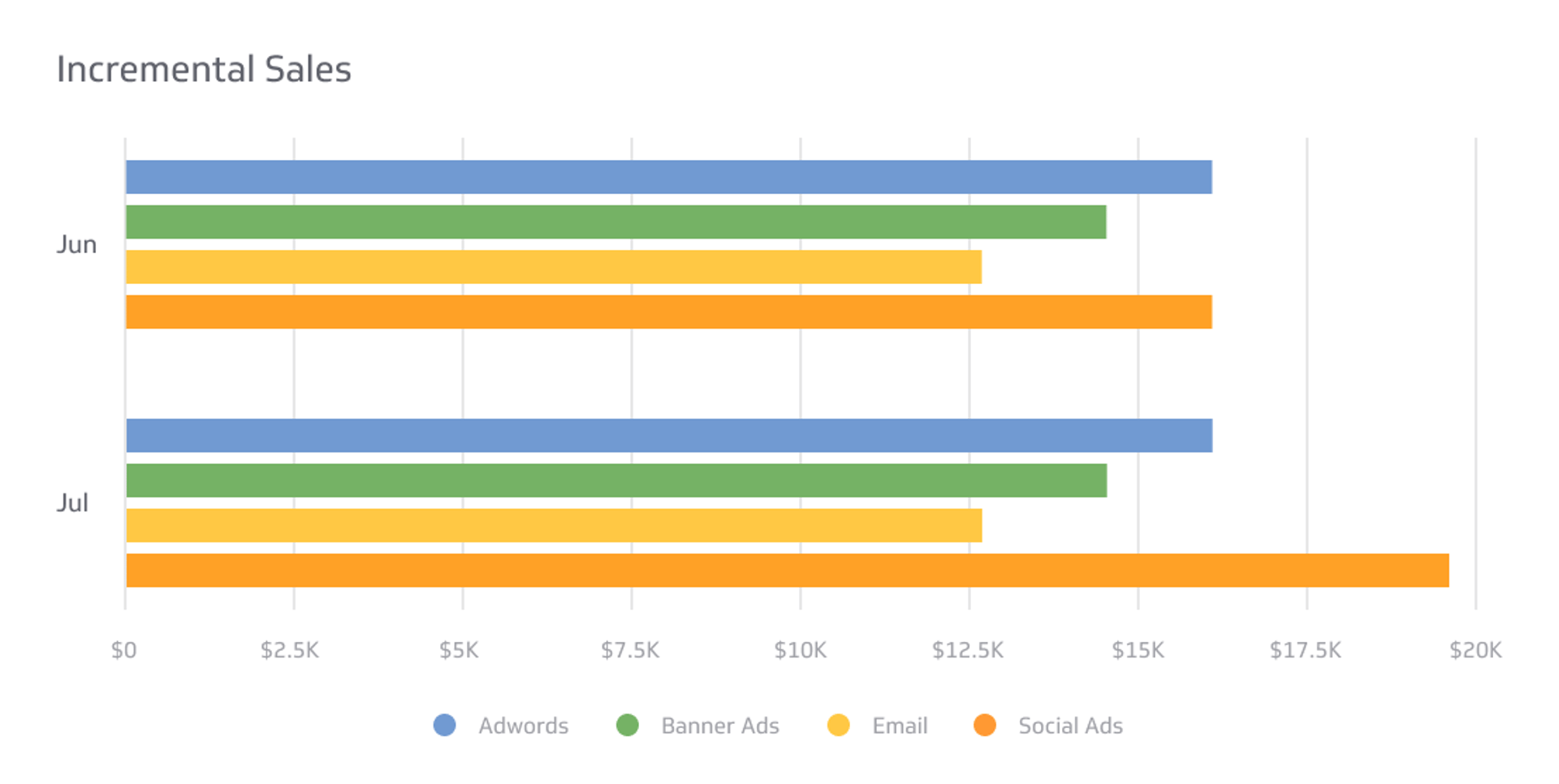I work with many software companies who are trying to grow. Often, these founders and CEOs take on the marketing responsibilities themselves in the early days to conserve cash. But there comes a point where the marketing workload becomes too much for a founder to handle alone.
That's why I'm seeing more and more SaaS companies bring on a fractional Chief Marketing Officer, or fractional CMO. This model allows you to tap into high-level strategic marketing talent without the cost of hiring a full-time CMO.
In this article, I'll explain when it makes sense to bring on a fractional CMO, what traits to look for, and how a fractional CMO can impact your marketing and revenue growth.
When Should You Hire a Fractional CMO?
Deciding when your company needs the experience of a CMO depends on a few factors:
- Your marketing workload exceeds your available time
- Marketing is not your core competency or passion
- You need an objective outside perspective on your marketing
- You don't have expertise in specific areas like branding, positioning, messaging, etc.
- You want to implement more sophisticated marketing campaigns and processes
I regularly see founders trying to manage all the marketing with just 1-2 junior hires to help with execution. This rarely scales, even with today's modern marketing technology stacks.

The role of the CMO has simply become too complex for an overworked founder to handle alone. At some point, the marketing catches up to you, and this is where a fractional CMO can help.
Early Stage is Less About titles, More About Skills
In the early days, you may not have a budget for a “CMO.” But you likely need the skills of someone who has operated at that level before. A fractional CMO has those skills while costing much less than hiring someone full time.
The key is finding marketing talent that punches above its weight class in terms of skills and experience you can access for the spend. The early stage is less about fancy titles and more about gaining access to the right skills.
What Type of Marketing Leader Do You Need?
Not all marketers have the same background. Some are more tactical and execution focused while others take a more strategic and conceptual approach.
You likely require a healthy combination of both at different stages, but in my experience, early-stage companies often lack strategic thinking more than tactical bandwidth. An experienced fractional CMO provides that strategic capability.
They also bring best practices around processes, campaign frameworks, and martech stacks so you can scale the operational side of marketing in a smart way over time.
Traits to Look For in a Fractional CMO
There's no one size fits all approach to the fractional Chief Marketing Officer role. The needs are different for an 8 figure ARR company vs. sub $5M ARR. But some qualities I always look for include:

Experienced - This is not a role for a junior person to gain experience. You need someone who has been there and done things successfully at scale already. Real CMO level experience ideally.
Strategic - Strong strategists stand out from implementers. You need someone comfortable dealing with complexity and capable of strategic thinking.
Specialist - Specialists with deep expertise in a specific area, such as branding, positioning, or messaging, often provide more value than generalist CMOs. These specialists offer established frameworks that companies can utilize effectively.
Analytical - You need someone comfortable interpreting data and results to make decisions. They should take an ROI-driven approach based on what the numbers tell them.
Agile - In early-stage companies, things move fast. You need someone who can deal with frequent priority shifts and rapid experimentation. Rigid thinkers don't work.
Aligned - They should think like an owner when it comes to growth and revenue impact, not someone just there to collect a paycheck.
Coach - The best fractional CMOs I've worked with take a coaching approach that transfers knowledge and builds the capabilities of your team over time.
Those are some key traits I look for. You likely need a balance of different strengths across branding, positioning, demand gen, and analytics. Understand where you have gaps or needs on your team and choose a fractional CMO to complement that.

How a Fractional CMO Drives Growth
If you find the right fractional CMO fit, they can massively impact growth across every stage of your customer's journey. Here are some of the key ways an experienced marketing leader drives results:
Brand Positioning & Messaging
An experienced CMO has a methodology for assessing market opportunities and properly framing your brand positioning and messaging to stand out. This leads to higher conversion rates downstream.
Content Strategy
They develop content strategies that attract and engage your ideal customers on their buyer's journey using thought leadership, campaigns, and even proactive PR outreach when appropriate.
Campaign Strategy
You get structured 90-day plans grounded in runway and revenue targets with clear KPIs to hit. Seasoned CMOs know how to translate goals into campaigns that convert.
Process Optimization
With experience overseeing marketing teams at scale, a fractional CMO establishes processes using technology and automation to gain efficiency.
Demand Generation
From top-of-funnel content programs to tightly aligned sales development, they put in place frameworks to generate qualified pipeline and accelerate outbound sales.
Enterprise Selling
For companies selling into enterprise accounts, a Fractional CMO provides executive selling experience and methodologies your team can leverage.
Technical Expertise
The marketing technology landscape offers an overwhelming menu of solutions. An experienced marketing leader guides your tech stack decisions based on martech experience.
Testing & Analysis
They bring an analytics-driven approach based on testing and iteration using data to make decisions. No campaign gets a blank check without scrutiny.
What's the Impact?
The right fractional Chief Marketing Officer delivers immense value across marketing, brand building, pipeline generation, positioning and more because you tap into their years of experience. Unlike junior hires, they don't need to learn on the job.

I've seen fractional CMOs drive 30%, 50% or even 100%+ increases in qualified pipeline within 6 months when aligned with sales.
One common misconception founders have is that marketing success stems mainly from spend and paid advertising budgets. The reality is you get the highest ROI when you nail strategy, positioning, and messaging first before pouring on more demand gen budget.
An experienced CMO optimizes those levers before simply trying to “spend your way to revenue.”
Without the expertise of someone who has navigated different growth stages multiple times, it's hard for founders to know what they don't know. The patterns look obvious in hindsight but are challenging to spot currently without experience.
Marketers Get You More Runway & Options
Beyond pipeline and revenue impact, a stellar marketing leader buys you options as the CEO. How? By generating more inbound interest and runway through non-paid channels.
Many founders believe fundraising success stems mainly from revenue and sales growth. But most experienced VCs know the demand you can generate through inbound interest, organic content marketing, PR etc. carries just as much weight.
So beyond the core revenue metrics, a strong brand and appetite for your product signals business viability and quantifies the market opportunity for investors.

How Much Does a Fractional CMO Cost?
Unlike hiring a full-time CMO who often costs $250K or more in annual compensation, fractional CMOs are part-time and work on a monthly retainer basis.
The costs can range quite a bit based on the experience level and scope needed but often fall somewhere between $5K to $15K+ per month for anywhere from 20 to 50% of their time.
To determine the appropriate budget range for you, think through these variables:
- What level of experience do you need right now?
- What are your most pressing areas of focus whether that's positioning and messaging work, campaign launches for lead gen, enterprise prospecting, etc.
- How much time per week do you think is required to have an impact on those areas based on your business size and model?
- What level of involvement do you want when it comes to their working process? Daily stand-ups? Weekly meetings? Quarterly reviews?
- What marketing initiatives would you no longer handle yourself after bringing on a fractional CMO? The more that gets taken off your plate, the higher the time requirements and costs.
Costs go up with more demand on their time, need for more frequent involvement, and higher levels of experience.
Larger and later stage companies tend to engage fractional executives on bigger monthly retainers exceeding $15-20K+ with more frequent involvement expected.
The key is balancing the budget with finding the right skills and experience fit first. Unlike an agency or freelancer charging by project or deliverable, a Fractional CMO's core value comes from their strategic guidance and leadership.
If the monthly cost allows you to tap into that experience and perspective at your stage, it pays dividends compared to only paying for tactical execution help.
But a fractional executive needs to align with your growth phase. Bringing on too senior level of a CMO too early can also have downsides if their experience is mainly with much larger companies.
It's all about the right fit.
Fractional vs. Agency vs. Consultant
How do fractional executives compare to alternatives like consultants and agencies when it comes to costs?
- Fractional Execs charge monthly retainers that provide you with access to ongoing strategic guidance from an experienced leader.
- Agencies charge by project so the scope of work varies by needs at any given time.
- Marketing consultants often price by week or day for advisory work.
Although fractional executives have higher based monthly costs, they drive more value by applying their know-how to a multitude of areas over time vs. just executing a one-off project.
Typical Fractional CMO Tenures
How long should you engage a fractional CMO before reassessing if it still makes sense?
Typical tenures I see tend to be 6 months to 2 years.
Shorter tenures make sense In early-stage companies where needs change faster. Start with a 6-month pilot, see the impact, and extend from there.
For later stage companies, multi-year tenures allow fractional executives to drive deeper change.
Most companies either promote part-time executives to full-time positions with increased responsibilities or let them go after about two years.
Why transition them out if going well? Sometimes needs simply change, or internal hires develop the experience for a new marketing lead to emerge from within.
A Worthwhile Investment
I've seen some companies hesitate to pay $10K a month for a world-class CMO. Yet, these same companies happily pay 3x more than that for technical consultants or agencies to handle a small piece of website work, design, or PPC campaigns.
It's easy to underestimate the value a fractional CMO brings relative to costs. But compared to the impact that marketing leadership has on the entire customer journey, it's one of the best investments you can make.
Without growth, nothing else matters. An experienced marketing leader focused on your vision can pay dividends for years down the road.
Find the Right Match
Not all Fractional CMOs offer the same value. Like finding any executive team member, you need to interview multiple qualified candidates and assess their experience level against your current business needs.
Develop a scorecard of must-have skills and make sure your priorities align. Treat finding fractional help like you would a full-time functional leader search.
Investing in an experienced marketing leader to provide that outside perspective offers some of the highest ROI available to founders and CEOs looking to drive growth.
If you're struggling to balance complex marketing decisions with limited experience as the founder, it's worth talking to a fractional CMO - even just to get an outside standpoint on your greatest challenges.
It could be one of the best decisions you make this year.






